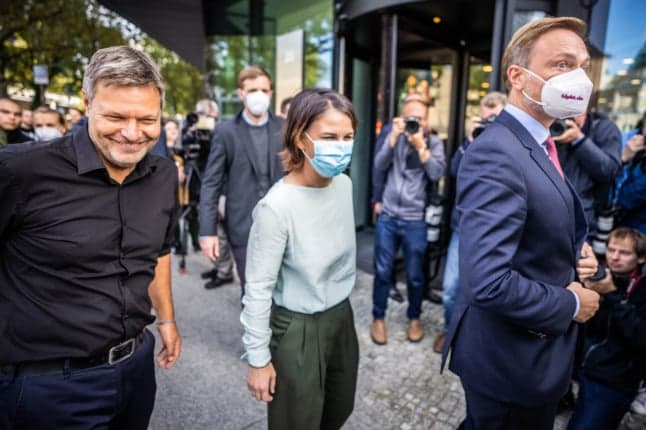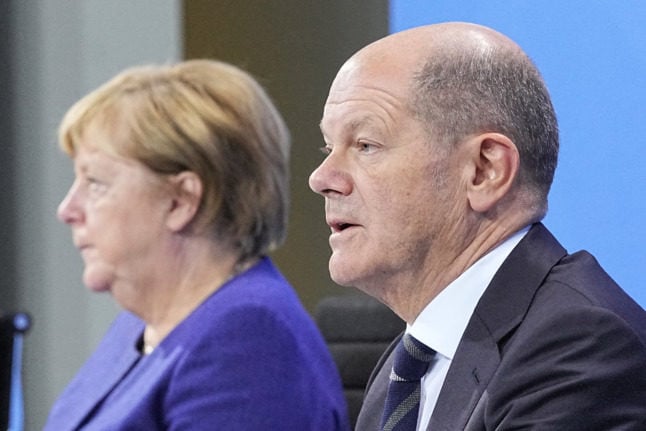German coalition parties to unveil deal for post-Merkel government

A centre-left-led alliance of parties is poised Wednesday to announce a deal to form Germany's next government, putting the Social Democrats (SPD) in charge for the first time in 16 years.
Two months after the SPD beat Angela Merkel's conservative CDU-CSU coalition in a general election, its negotiators put the finishing touches on the deal with the Greens and liberal Free Democrats that will install Finance Minister Olaf Scholz, 63, as chancellor.
READ ALSO: German parties aim for Scholz-led government by early December
The relatively rapid accord is likely to be greeted by a heave of relief by international partners wary of a hamstrung Germany while crises from the coronavirus pandemic to Belarus to a weak economic recovery rage.
"On Wednesday, the main negotiating round of the SPD, Greens and FDP will meet for their final session," said the parties in a statement.
"Afterwards, the leaders of the three parties and the candidate for chancellor, Olaf Scholz, will present the coalition agreement negotiated in recent weeks," they added.
With the so-called coalition contract, the parties have essentially set their policy roadmap for the next four years.
Expected to feature in the agreement along with their stance vis-a-vis foreign policy will be a plan to bring Germany's exit out of coal forward to 2030 from 2038 and a proposal to legalise recreational use of cannabis.
'Super' ministry?
Negotiators are also likely to have resolved a thorny part of the negotiations - which party takes which ministry.
Latest lists leaked on the ministry distribution show Christian Lindner, leader of the business-friendly FDP, running the powerful finance ministry of Europe's biggest economy.
READ ALSO: KEY POINTS: What Germany’s three parties in coalition talks have agreed
Robert Habeck, co-leader of the ecologist Greens, is touted to lead a new 'super-ministry' grouping the portfolios of economy, climate protection and energy.
Annalena Baerbock, the Greens' other leader, will likely become Germany's next foreign minister -- the first woman in the job.
The health ministry, which has become highly crucial but also a hot potato during the pandemic, is expected to go to the SPD, according to German media.
The line-up, if confirmed, hints at a Germany that could take a more assertive tone vis-a-vis China and Russia, while economically, it would likely stick to budgetary rigour while aggressively pushing green investments.
The swift pace at which the three parties - known in Germany as the Ampel or "traffic-light" after their colours - came together is a surprise given that the FDP is not a natural partner with the centre-left SPD or Greens.
But the parties are anxious to avoid a repeat of the messy negotiations last time round, when Lindner was vilified for pulling the plug on talks with Merkel's CDU-CSU and the Greens.
Ahead of the carefully choreographed announcement this time round, parties showed extraordinary discipline, preventing any details of talks leaking to the press and thereby avoiding the recriminations that came with dirty laundry being aired in the public.
READ ALSO: What Germany’s coalition plans mean for immigration and citizenship
'Sleep soundly'
Known for her steady hand steering Germany through the eurozone crisis, migrant influx and Brexit, Merkel is heading into political retirement after more than 16 years in office.
Mindful of the value placed on a stable Germany, the veteran politician has taken pains to ensure an orderly transition.
Stressing continuity, she included Scholz in key bilateral meetings during the G20 summit in Rome in October including with US President Joe Biden.
When she met regional leaders of Germany's 16 states for urgent talks last week on the pandemic, Scholz was prominently also in attendance.

Acting Chancellor Angela Merkel and incoming Chancellor Olaf Scholz appear together at press conference following a meeting on Covid regulations on November 18th, 2021. Photo: picture alliance/dpa/dpa POOL | Michael Kappeler
She has also shrugged aside the fact that Scholz stems from a rival political party.
Asked by the Süddeutsche Zeitung how she felt about a Social Democrat being back in charge soon, Merkel was sanguine: "There will be political differences, of course. But I will be able to sleep soundly."
Vote of confidence from Merkel aside, Scholz is an experienced hand, having been labour minister in her first coalition from 2007 to 2009 before taking over as vice-chancellor and finance minister in 2015.
Known for being meticulous, confident and fiercely ambitious, he has cemented his reputation as a fiscal conservative - something that at times puts him at odds with his workers' party.
Yet a calm demeanour has helped him weather turbulent times, including harsh criticism in the last weeks over his relative silence as leader-in-waiting while the pandemic takes a dramatic turn for the worse.
By Hui Min Neo
Comments
See Also
Two months after the SPD beat Angela Merkel's conservative CDU-CSU coalition in a general election, its negotiators put the finishing touches on the deal with the Greens and liberal Free Democrats that will install Finance Minister Olaf Scholz, 63, as chancellor.
READ ALSO: German parties aim for Scholz-led government by early December
The relatively rapid accord is likely to be greeted by a heave of relief by international partners wary of a hamstrung Germany while crises from the coronavirus pandemic to Belarus to a weak economic recovery rage.
"On Wednesday, the main negotiating round of the SPD, Greens and FDP will meet for their final session," said the parties in a statement.
"Afterwards, the leaders of the three parties and the candidate for chancellor, Olaf Scholz, will present the coalition agreement negotiated in recent weeks," they added.
With the so-called coalition contract, the parties have essentially set their policy roadmap for the next four years.
Expected to feature in the agreement along with their stance vis-a-vis foreign policy will be a plan to bring Germany's exit out of coal forward to 2030 from 2038 and a proposal to legalise recreational use of cannabis.
'Super' ministry?
Negotiators are also likely to have resolved a thorny part of the negotiations - which party takes which ministry.
Latest lists leaked on the ministry distribution show Christian Lindner, leader of the business-friendly FDP, running the powerful finance ministry of Europe's biggest economy.
READ ALSO: KEY POINTS: What Germany’s three parties in coalition talks have agreed
Robert Habeck, co-leader of the ecologist Greens, is touted to lead a new 'super-ministry' grouping the portfolios of economy, climate protection and energy.
Annalena Baerbock, the Greens' other leader, will likely become Germany's next foreign minister -- the first woman in the job.
The health ministry, which has become highly crucial but also a hot potato during the pandemic, is expected to go to the SPD, according to German media.
The line-up, if confirmed, hints at a Germany that could take a more assertive tone vis-a-vis China and Russia, while economically, it would likely stick to budgetary rigour while aggressively pushing green investments.
The swift pace at which the three parties - known in Germany as the Ampel or "traffic-light" after their colours - came together is a surprise given that the FDP is not a natural partner with the centre-left SPD or Greens.
But the parties are anxious to avoid a repeat of the messy negotiations last time round, when Lindner was vilified for pulling the plug on talks with Merkel's CDU-CSU and the Greens.
Ahead of the carefully choreographed announcement this time round, parties showed extraordinary discipline, preventing any details of talks leaking to the press and thereby avoiding the recriminations that came with dirty laundry being aired in the public.
READ ALSO: What Germany’s coalition plans mean for immigration and citizenship
'Sleep soundly'
Known for her steady hand steering Germany through the eurozone crisis, migrant influx and Brexit, Merkel is heading into political retirement after more than 16 years in office.
Mindful of the value placed on a stable Germany, the veteran politician has taken pains to ensure an orderly transition.
Stressing continuity, she included Scholz in key bilateral meetings during the G20 summit in Rome in October including with US President Joe Biden.
When she met regional leaders of Germany's 16 states for urgent talks last week on the pandemic, Scholz was prominently also in attendance.

Acting Chancellor Angela Merkel and incoming Chancellor Olaf Scholz appear together at press conference following a meeting on Covid regulations on November 18th, 2021. Photo: picture alliance/dpa/dpa POOL | Michael Kappeler
She has also shrugged aside the fact that Scholz stems from a rival political party.
Asked by the Süddeutsche Zeitung how she felt about a Social Democrat being back in charge soon, Merkel was sanguine: "There will be political differences, of course. But I will be able to sleep soundly."
Vote of confidence from Merkel aside, Scholz is an experienced hand, having been labour minister in her first coalition from 2007 to 2009 before taking over as vice-chancellor and finance minister in 2015.
Known for being meticulous, confident and fiercely ambitious, he has cemented his reputation as a fiscal conservative - something that at times puts him at odds with his workers' party.
Yet a calm demeanour has helped him weather turbulent times, including harsh criticism in the last weeks over his relative silence as leader-in-waiting while the pandemic takes a dramatic turn for the worse.
By Hui Min Neo
Join the conversation in our comments section below. Share your own views and experience and if you have a question or suggestion for our journalists then email us at [email protected].
Please keep comments civil, constructive and on topic – and make sure to read our terms of use before getting involved.
Please log in here to leave a comment.